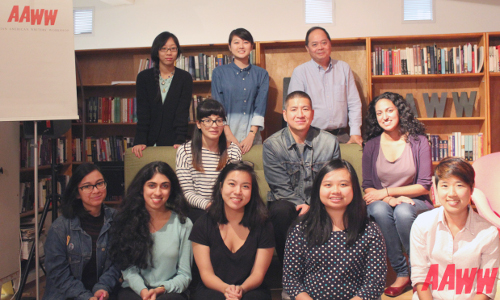Allow yourself to be messy. Don’t try to fight writer’s block. These, and some other writing tips from author Eric Tang.
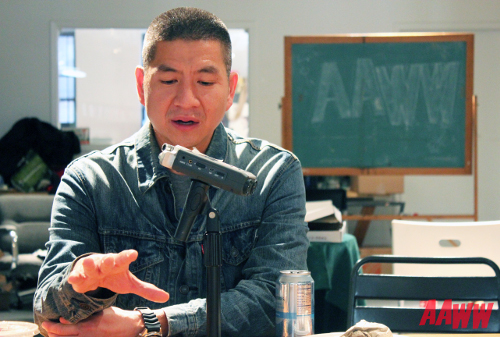
December 4, 2015
A few weeks before his book, Unsettled: Cambodian Refugees in the New York Hyperghetto, was released in October, Eric Tang sat down for a brown-bag lunch with staff and interns of the Asian American Writers’ Workshop. Tang talked about why he wrote the book, the greatest challenge he faced in writing it, and other wide-ranging topics over pizza and soda. Below is an excerpt of that free-wheeling discussion.
_________________________________
On the Cambodian refugees in The Bronx
This book is the first full-length manuscript or monograph about the Cambodian refugees of New York City, in The Bronx. I spent the better part of my 20s during the mid-1990s to early 2000s working as a community organizer in northwest Bronx, which is where the refugee community — the Southeast Asian refugee community — is located.
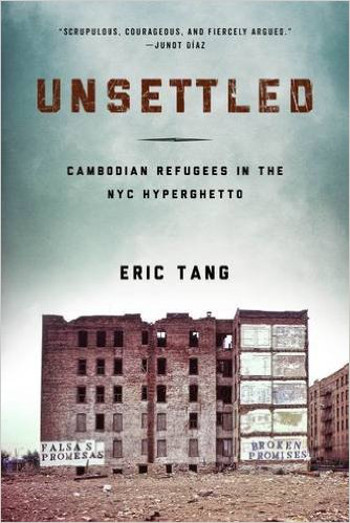
Between 1980 and 1994, approximately 10,000 Southeast Asian refugees, mostly from Cambodia and Vietnam, resettled in that area of The Bronx. The vast majority of them did not stay in that area but moved on to places with slightly better housing and job opportunities throughout the Northeast.
By the early 2000s, I would say the population of Southeast Asians leveled off at about 4,000. And those were the years that I worked as a community organizer around anti- poverty issues, mostly related to housing and welfare.
We realized that a very large segment of the population was composed of young people in their teens and early 20s. This had something to do with the tragedy of the Cambodian genocide where many families, who had lost children and time to the genocide, were reconstituting families in the camps. So by the time they were resettling in the U.S., they had 4-year-olds and 5-year-olds, who, by the time I started working with them, were teenagers.
So we saw this need in the community for a youth program. Our anti- poverty organizing centered on working with the teens in the neighborhood. In many ways, they are natural advocates and organizers for their families to begin with, because each day they were in welfare centers dealing with bureaucrats who were not very kind to their parents — who sometimes humiliated their parents — or dealing with landlords who were unscrupulous.
On why he wrote the book and how refugees view their salvation
In 2009, after finishing grad school and having left community organizing for several years, I wanted to write about my experience working in The Bronx. I wanted to capture what I considered to be this ambivalence on behalf of a lot of refugees who had been resettled to the U.S. They had escaped certain death, right? And yet, upon being here in the United States, there was this ambivalence they expressed.
This notion of having crossed and having been saved was something that the handlers and the politicians kind of put upon them. But this transfiguration that the refugee was supposed to feel when arriving was never really felt by the people I worked with. As a community organizer, I felt that clearly they’re here and the promise of resettlement has yet to be fulfilled and we’re going to help them fulfill that promise with community organizing.
“I think you allow yourself to be as messy as possible from the outside. And this is the scary part because here you are, you’re determined to write a book but you don’t know if it’s going to work from the beginning. In fact you don’t even know if it’s going to work until the penultimate stage of the manuscript.”
But I always felt from them that the promise was false. That they never really believed it as much as everyone else around them did. So when I thought about writing this book, I thought about trying to represent that ambivalence as best as I could, and trying to bridge this gap between my expectations as a community organizer and how refugees understood their own reality.
What I say in the book is that the refugee – when you talk to them, you find out that you need their survival story and their liberation story more than they do. As a community organizer, you need that transition, that transfigurative change that says, “Okay you’ve arrived– now what?”
But they don’t feel the past or the present is separate. They don’t feel the past or present as being broken. It’s really unbroken, so this book was my attempt to go back and reflect upon my community organizing years, to recover that and to find a way to represent that.
On how he chose the main character of his book
I did it through the story of one woman in particular. Her name is Ra, who I’ve known for many years. I’ve advocated for her and I’ve worked in organizing with her children and we stayed in touch. As I began this project, I talked to several people in the community who I’ve worked with and she was one of the very first people I talked to who immediately understood the project.
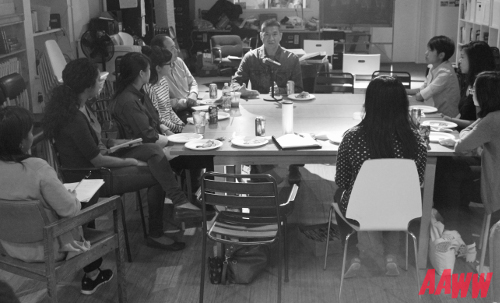
She said, “Eric, I have a story to tell and I want you to tell it.”
Before long, I realized this book that I wanted to write about, how the refugee understands time and space that I call refugee temporality, could simultaneously be a story of her life. Not an exhaustive biography but key scenes across different spaces in what I call the hyperghetto.
These key scenes include the welfare state, housing, the home-based garment industry, dealing with patriarchal institutions, as they take shape and criminal justice in the child-welfare state. This really interesting story arc began to develop around her that joined nicely with my desire to tell a story about refugee temporality.
So that was the project in a nutshell. I wrote it as an ethnography primarily, but there were moments where it drifts into cultural studies and other moments when it drifts into creative nonfiction, all of which I enjoy. But at the heart of it is really Ra’s story, and I try to adhere to that as much as possible.
On why you should allow yourself to be messy
How do you go about organizing a project like this? I think you allow yourself to be as messy as possible from the outside. And this is the scary part because here you are, you’re determined to write a book but you don’t know if it’s going to work from the beginning. In fact you don’t even know if it’s going to work until the penultimate stage of the manuscript.
I think what you do is you allow yourself to be as messy as possible in the beginning. I do nonfiction, so this is based on interviews. What I do is I listen to hours and hours of the interviews I’ve recorded and then I read over the notes that I’ve taken. I look for moments in the interviews or in my notes where something just flashes; like there’s a scene that just flashes and that is to me is something I just can’t stop thinking about.
“The hardest part of writing the story was competing with my children for time and attention. As I write lovingly in the acknowledgements, my children taught me how to write like a fugitive – in those stolen moments, away from their laughter and brilliance.”
Even if it doesn’t seem that profound at the moment it stays with me almost like a catechism – this word that she said, or this phrase that she said, that usually forms the basis for some chapter, or some idea that needs to be worked through. Or, if she pivots back consistently to a scene in her life. She talks about this arranged marriage she had with the Khmer Rouge. Even when I go off to another topic, she wants to come back to this and it seems almost like a non sequitur or just really oblique “why are you going back to this?”
I realized this is where this notion of refugee temporality, this notion of the past being unbroken with the present, is most meaningful to her. So that forms the basis of a chapter.
Or, if one of her children who I was also interviewing brings up a pivotal memory.
On a pivotal memory that was crucial in moving the story forward
There’s one scene in a refugee camp where her oldest daughter is sitting on her lap, and Ra’s husband at the time is sitting about a hundred yards away being interviewed by the U.S. State Department representative, who interviews these refugees for asylum. Ra and her husband have this agreement where they’re going to lie about how long they were under Khmer Rouge captivity because they feel if they were under captivity for too long, it would make it seem like they were collaborators with the Khmer Rouge.
So they had this plan to lie but Ra was looking at her husband and thought, “Wow, this guy is going crack under pressure.” But Ra was not allowed to go over, so she tells her daughter who was eating ice cream: “I will buy you another ice cream if you go over to your dad and tell him in Khmer: ‘Don’t lie; if you fail, you fail. But don’t lie.’”
She goes over and she says, “Mom says don’t lie– if you fall down, you fall down.” And the father was like, “What?”
The Khmer translator understands what’s happening so he starts laughing. The guy from the State Department was, like, what’s going on, and demanded that the translator explain what the young girl said.
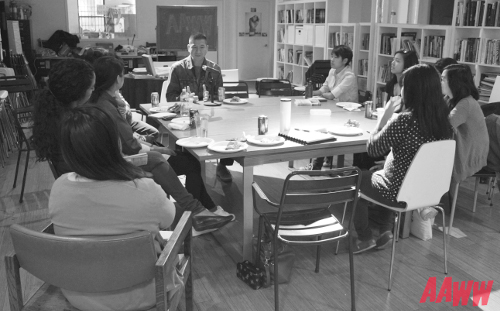
So the guy from the State Department says, “Look, your wife says don’t lie. You seem like people who would want to be honest, so don’t lie and tell the truth.”
And it actually worked for them; it got them through. That could’ve just been this anecdote but it was pivotal in explaining just how arbitrary the asylum process is. How do these bureaucrats know who’s telling the truth and who’s lying?
We know for certain that a good number of Khmer Rouge officers and cadre got through and got resettled in the U.S. Some of them travelled right into the camp of the people they tortured. Some of us know this for a fact and the refugees know that. To then kind of put upon them this notion that they have crossed through into the land of salvation, and they are somehow to be changed and forever in gratitude for this opportunity, is something we put upon them.
It doesn’t square with reality for them and that’s what I want to capture – this ambivalence they feel upon crossing. I allow these scenes to kind of pop up in the text, in the transcripts. And when these things flash, they help me make a decision about where to go with the book and hopefully, it will all get organized in a way that will make for seamless narrative. But you’ve got to work through and a lot of stuff gets left on the cutting room floors.
On why you should learn how to write like a fugitive
The hardest part of writing the story was competing with my children for time and attention. As I write lovingly in the acknowledgements, my children taught me how to write like a fugitive – in those stolen moments, away from their laughter and brilliance. So here they are; they’re these brilliant creatures who are funny as hell and yet a thought comes to mind for the book and I just have to find anything to write it down on. Anything: cereal box, a Kleenex. And that’s writing like a fugitive — write anywhere.
So that was probably the most challenging thing – time, just finding the moments to really kind of give myself the time needed to get this story as right as I could.
“Writer’s block is a mean dude. On most days he will own you. I don’t fight it, I go through mundane tasks, such as footnotes. All those things are nice distractions and it’ll eventually come back and you have to trust that.”
On his fear that he may not get the story right
In addition to that, I think it was the fear that you’re not going to get it right. You’re talking about someone’s life. And even though they’ve authorized you to tell the story – wow, that’s a huge responsibility. And Ra is using her actual name; she’s not using a pseudonym. She wants people to know this is her life and that’s what’s happened. You want to hue as closely to her story as you possibly can while at the same time joining it with your own kind of interpretation.
I hope and this is where you all can choose to read the book and tell me if I’ve hit it or not. I hope to strike this balance between seeing clearly where her voice is foregrounded and where my interpretation joins or accompanies her.
On why mothers know best
My mom is a post-1965 immigrant. English is not her first language but she can read enough she gets through the Reader’s Digest. She told me, “Listen if you’re going to write a book, make sure I can read it.”
That was a great bar for me. And yes, she was one of the first people to read it. She got it on Amazon, pre-order and took a train to Virginia for some reason. She said, “I read it on the way for seven hours and seven hours back. Yes, it was pretty good.”
On whether writing is more validating than community organizing
Activism is organizing difficult things that rarely result in success and in some ways, require failure. That sounds a lot like writing to me. To me, the two are very similar in that they’re humbling, they’re difficult, they require a lot of failure before you get them write. I try to write about activism in that way.
This is not about all of the things we’ve accomplished but the things we’ve attempted to do and the things that worked but also didn’t work, and what we can learn from them. To me that’s what writing activism is about. I have no problem with people who just chronicle their activism; I’ll read that stuff anytime. But I’m more persuaded by folks who write about what was hard, where we failed, where we could have been better so that future generation can absorb those insights.
“Each hour, as a writer, is never equivalent. There are some hours where you’ve written nothing but they could be really productive and you have to believe that, no matter how self-serving that may sound.”
On how community organizing and academia feed on each other
Those two things are remarkably unstructured activities, yet together they kind of give each other structure.
Here’s what I mean by that: In community organizing it’s all about prescription: What’s the problem? What’s the solution? Give me a concrete demand or goal, let’s work on it.
In academia, it’s all about speculation and theorizing. What’s the problem and how can we problematize it even more? And so, and I love both worlds, but both worlds are frustrating on their own.
Writing this book allowed me to take the best of both worlds and merge them. And so, you know I talk about the kind of concrete solutions we attempted as organizers to implement, to solve these problems. But then I go back and reflect on their limitations, not to say that we shouldn’t have done it but just to say here’s what we missed, so that future community organizers might learn something from our efforts.
It was really a good process for me to kind of undergo that kind of chronicling of what we did. So that we have a record of this kind of activism in this community. We’re chronicling this stuff but at the same time as a scholar , as a researcher, as an intellectual– whatever you want to call it, — I’m able to critique it.
And even as the refugees participated in these collective demands for rights, they were skeptical of rights. What rights? Do you know where we’ve been? Did you know we’ve never had anything to negotiate with? And what makes you think we have anything to negotiate with now? And yet they still participate, right?
That ambivalence was really important for me to get to. As a work of scholar activism, this book allowed me to do both. Two really frustrating worlds I inhabited, coming together, and giving each other some structure, some balance.
On how to get around a writer’s block
I like to run, running gets you out of; it breaks the writer’s block. I think a part of what I also do is I try to move on to some mundane task that I have to do that’s more annoying and then you realize, “Oh, okay.” And then you go back.
What I don’t do is try to fight a losing battle. I don’t, I bow out gracefully. Writer’s block is a mean dude. On most days he will own you. I don’t fight it, I go through mundane tasks, such as footnotes. All those things are nice distractions and it’ll eventually come back and you have to trust that. That’s the thing with writer’s block. You have to trust that you’ve always gotten out of it, so why wouldn’t you get out of it this time?
It’s only when you don’t believe that, even when it’s been empirically proven to you, time and again, that you are able to get out of that, that you start panicking and it just brings more block. Just trust that you’ll get out of it and as bad as it feels – whole day wasted sometimes – it’s never completely wasted. Each hour, as a writer, is never equivalent. There are some hours where you’ve written nothing but they could be really productive and you have to believe that, no matter how self-serving that may sound.
